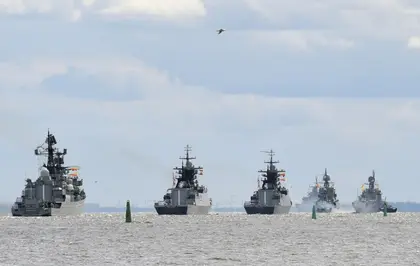Naval commanders of the Kremlin’s once-mighty Black Sea Fleet (BSF) are shifting warships from their traditional Crimean home base Sevastopol to safer waters back in Russia, a senior Ukrainian military intelligence said Friday.
Intensifying Ukrainian strikes near the Russia-occupied Crimea peninsula and Kremlin fears precision-guided weapons could hit Russian fleet elements tied up at Sevastopol piers, or simply leave them without fuel, are largely responsible for Moscow’s decision, said Major General Vadym Skibitsky, deputy chief of Ukraine's Defence Intelligence, in an interview with the Kyiv TV channel.
- Look at the most up-to-date Ukraine news that came out today.
- Check out the freshest Ukraine news items as of today.
JOIN US ON TELEGRAM
Follow our coverage of the war on the @Kyivpost_official.
Russia’s naval high command is re-basing BSF vessels assigned to Sevastopol to the port Novorossisk on the eastern Black Sea coast, Skibitsky said.
“If you’re talking about military vessels, well, here we see that they (Russian naval high command) are afraid,” he said. “We see, factually, if you are talking specifically about the [military] base Sevastopol, and other military facilities, in the first place they are now being very heavily guarded; the occupiers are equipping positions to protect against attacks on this infrastructure.”
“And the other thing is, the majority of the warships, they’ve moved from Sevastopol to the mainland of Russia, specifically to Novorossisk, in order to avoid their destruction while being based in the occupied territory [in Crimea],” Skibitsky said.

Now It’s Time to Pull Together – Surely?
Located in Russia’s southern Kuban region on the Black Sea’s east coast, Novorossisk is more than 350 km. distant from and well out of range of probable anti-ship missile launch sites in Ukraine-controlled territory.
On Sunday, according to Ukraine’s Joint Forces South situation estimate for the day, two Russian missile-carrying submarines exited Sevastopol base and joined an 11-ship flotilla in the eastern Black Sea. It wasn’t clear, from Joint Forces South or from independent sources, whether the BSF warships operating off the shore of Crimea were now formally home-based in Novorossisk.
Skibitsky said the Kremlin is deeply concerned that Ukrainian troops advancing in the upcoming Spring offensive will, given Kyiv’s arsenal of mid-range anti-ship weapons, make Sevastopol port in Crimea too dangerous for the Russian navy to use.
“They’re afraid of everything - of strike drones, of saboteurs, of missiles, of any actions. Because they (threats of attack) exist, and they will exist in the future,” he said.
The Ukrainian intelligence officer’s comments came in the wake of a pair of long-range strikes against southern Russia fuel storage and production sites, in mainland Russia, both critically important to the fuel logistics supply chain in Crimea.
A Ukrainian massed drone strike against the Taman port fuel base on Wednesday hit a diesel fuel storage farm adjacent to the single bridge connecting mainland Russia with the Crimean Peninsula. Russian air defenses reportedly knocked down 10-12 kamikaze aircraft but two struck fuel reservoirs and detonated, touching off a massive fire covering an estimated 1.3 square km. of the facility, news reports said.
Russian officials said 188 firefighters had the blaze under control by Thursday. The attack appeared to have torched half of the fuel reservoirs on the base, potentially destroying hundreds of tons of diesel fuel destined for use in Crimea, open-source satellite photos published by the US group Maxar showed.
A single Ukrainian drone on Wednesday in another nighttime strike hit and set on fire buildings and fuel transportation infrastructure at the Ilsk oil refinery, some 150 distant from the Taman facility, in Russia’s Krasnodar Oblast’.
State-controlled Russian news reports and social media showed smoke still rising from the Ilsk facility on Friday. Ukrainian journalist Andrij Tsaplenko in a Friday Telegram post said the site’s primary role was supplying fuel to Russian military units in Crimea, particularly the BSF.
Serhiy Bratchuk, head of Ukraine’s Odesa regional defense command, in Thursday evening comments on the Mi-Ukrainy television program, said Sevastopol port no longer is a safe haven for the Russian navy.
“It will now be a little safer for enemy ships to be on combat duty than in the bays in Sevastopol. (BSF commander) will ask them to go to sea, because it will probably be safer than being in the bays of temporarily occupied Sevastopol,” Bratchuk said.
The pro-Russia Readovka news platform in a Friday editorial on future Ukraine long-range strikes against Crimea said: “Next time, the enemy may launch not 10, but 20 or 100 such UAVs (drones)… It's time to wake up, otherwise, we will have more than one ‘Sevastopol wake-up call’ waiting for us.”
Ukraine’s military is known to operate domestically developed Neptune anti-ship missiles and US-developed Harpoon anti-ship missiles.
Both systems have a reported effective range of 150-200 km. - a little too far to hit Russian ships in Sevastopol from present fighting lines, but close enough for strikes were Ukraine’s long-awaited Spring offensive to advance fighting lines even 50 km. Southwards.
Russia invaded and in violation of security treaties annexed Ukraine’s Crimea region in 2014. The Kremlin at the time claimed the Crimea population supported the move and that, in any case, the need to guarantee security for Russia’s rented naval in Sevastopol justified the takeover.
Since Russia’s Feb. 2022 invasion, Ukraine has targeted Russian warships and naval facilities in Crimea repeatedly with drones, surface-to-surface missiles, and even remote-contolled motorboats loaded with explosives.
The most spectacular attack took place on Oct. 29 when nine high-speed robot boats charged Sevastopol harbor in a dawn kamikaze assault. One Russian frigate was put out of action and other warships were damaged in the raid.
You can also highlight the text and press Ctrl + Enter










